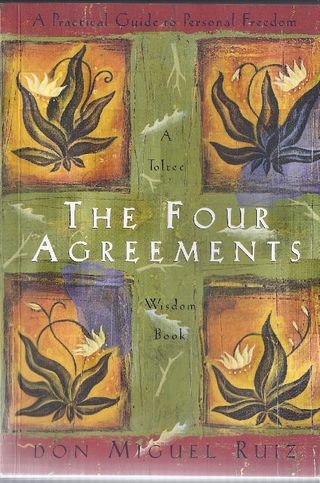Wisdom
Agreeing with the Four Agreements
Forty years after reading Castaneda, I reconsider ancient Toltec wisdom.
Posted December 29, 2010 Reviewed by Lybi Ma
At the end of my previous post, Selective Shopping in the Cafeteria of Life, I promised to examine "Ancient Toltec Wisdom" for ideas that might be of value to the modern mind. Today I am making good on that promise.

Specifically, I want to write about a book by Don Miguel Ruiz, The Four Agreements: A Practical Guide to Personal Freedom, a Toltec Wisdom Book. A very long title for a very short book (138 5"x7" pages). Despite the claim that the ideas in this book represent insights possessed by the Toltecs a thousand years ago, in what is now Mexico, most of these ideas are highly similar to concepts used by modern humanistic psychologists, transactional analysts, and cognitive-behavioral psychologists.
For example, Ruiz says that all children are born perfectly loving, playful, and genuine. However, parents teach their children what Carl Rogers called conditions of worth–standards of behavior the children must follow to receive love and avoid criticism. Eventually, these standards become internalized into what Eric Berne called a life script–an unconscious set of instructions for living life.
According to Ruiz, most of these unconscious beliefs are perfectly arbitrary or downright false. Many of them are irrational and unnecessarily limiting. The key to freedom, according to cognitive therapists such as Albert Ellis and Aaron Beck, is to become aware of our irrational and limiting thoughts so that we can replace them with healthy thoughts. In short, this book could be a primer for cognitive-behavioral therapy.
Ruiz says that children do not know any better than to agree with the adult realities into which they are indoctrinated. Children do not argue with the meanings of words or grammar as they are learning language. If my parents tell me I am smart and handsome, I believe them. If they tell me I am stupid and ugly, I believe them. Children have no choice but to agree. They are like Plato's prisoners in the cave, shackled and forced into believing that shadows of artificial objects are real.
But as we mature, we can become warriors, breaking free from the shackles of agreements with our implanted, false ideas. We can accept healthier agreements. Ruiz presents four such healthier agreements in his book. Below is a Reader's Digest version; I have written more extensively on the agreements elsewhere.
1. Be impeccable with your word. In a sense, social constructivists are correct about words creating reality. We act on what we tell ourselves is real. Albert Ellis encouraged us to screen our self-talk for negative, irrational chatter. What kinds of words do you use when you describe reality? Do you lie and say hurtful and poisonous things about yourself and others? (Not healthy.) To be impeccable with your word is to be truthful and to say things that have a positive influence on yourself and others.
2. Don't take anything personally. The first agreement suggests that we avoid treating others hurtfully. The second agreement provides us with a way of dealing with potentially hurtful treatment from others. Because each person sees the world in a unique way, the way that others treat us says as much about them as it does about us. Not taking anything personally is to acknowledge the unique identities of other people. We respect their subjective realities, realizing that their views do not necessarily describe us accurately.
3. Don't make assumptions. Assuming that you know what other people are thinking or feeling about you is a limiting thought that Aaron Beck called Mind Reading. Obviously, none of us can read minds. When we try to engage in mind reading we will often be wrong, leading to undesirable consequences. The antidote to mind reading is to ask for evidence before concluding what people are thinking.
4. Always do your best. One obvious reason for doing your best is that we cannot achieve our goals by being lazy. If you do your best, not only are you are more likely to achieve goals, but you will also avoid criticism from what Ruiz calls your internal Judge. There are also more subtle issues about doing "your best." One is that you should not try to do better than your best. Pushing yourself too hard can cause pain, injury, and mistakes. More subtle still is the recognition that our "best" will vary from moment to moment, that, in a sense, you are always doing your best. Realize this, and your inner Judge can take a permanent vacation.
Do these four agreements actually derive from ancient Toltec wisdom? I will bet that many hard-nosed skeptics would have serious doubts about that. I am a skeptic myself. But to my fellow skeptics, I might mention that Ruiz's next book, The Fifth Agreement, suggests the following agreement: "Be skeptical but learn to listen."




